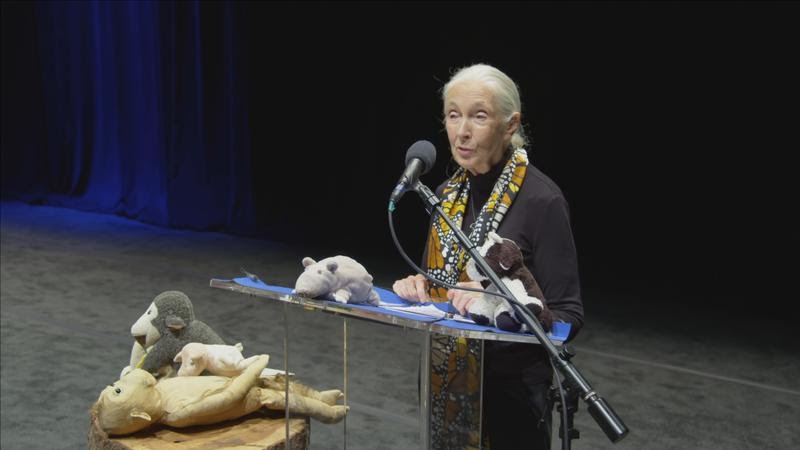Dr. Jane Goodall’s Hope for the World Amidst a Global Pandemic
On April 19th, National Geographic hosted a live Q&A with Dr. Jane Goodall to promote the new documentary film, Jane Goodall: The Hope, premiering this Earth Day on National Geographic, Disney+, and Hulu. Actor Pierce Brosnan and his wife Keely Shaye Smith moderated the presentation, with a few special guests along the way. It was an engaging conversation about the current state of the world amid a global pandemic and what everyone can do to make sure we don’t steer too far off track going forward.
Before the presentation began, the Chairman of National Geographic Partners shared that Dr. Jane Goodall was supposed to appear at their campus in Washington, D.C., in early April and had a speaking engagement at Disney’s Animal Kingdom theme park on April 22nd to celebrate Earth Day. She recently turned 86-years-old and has only gotten busier over the years. Jane Goodall shared that she was walking out the door to get in a car to the airport for a United Nations event in Belgium when she got the news that England had entered a state of lockdown. Around that time, she had started receiving cancellations from planned lectures in the United States.
If you’re Jane Goodall and your ability to travel the world to talk to audiences about conservation were halted by a global pandemic, what would you do? The answer is continue to do your work in a virtual landscape. “I have never been more busy in my entire life than I am right now.” She’s sheltering-in-place with her sister in a family home in England participating in online lectures, podcasts, and reading books for children. She feels like she’s able to do more now on a global scale than she was when she was constantly traveling.
Jane is passionate about educating children to become advocates for the planet. What she hopes audiences take away from the new film is that every person matters and little kids can make a big difference by influencing their parents. “Seeds can grow after 2,000 years,” she said in reference to her Roots & Shoots education programs, which have run on and off over several decades in over 65 countries. This includes China, where the program started in the mid-90’s.
“This pandemic has been predicted for years and years,” Jane shared about the novel Coronavirus. In her opinion, the global pandemic came about because of mankind’s disrespect of the natural world. She hopes this is a tipping point for the world to move in another direction. “We have to look at our own lifestyles and make changes.” Reports of improved air quality and cleaner water in densely populated areas show what can happen when we reduce our carbon footprint, but Jane Goodall fears that world leaders are pulling back too many environmental protections in an effort to speed up economies again, which would undo all the good we’ve seen so far and possibly make things worse.
“How is it possible that the most intellectual species to ever walk the planet is destroying their only home?,” Jane Goodall asked the audience. She says there’s a disconnect between the head and the heart for a lot of people, which she says is what caused the COVID-19 pandemic to begin with. People have destroyed habitats, forcing animals into closer contact with humans allowing viruses to spill over. Trafficking, hunting, and exploiting animals in factory farms have all come back around with the pandemic. For the environment, deforestation, ocean pollution, and spitting fossil fuels into the air are destroying the earth. Every major religion has the same golden rule of treating others the way we want to be treated. Jane said that bringing animals into that equation would solve a lot of the world’s problems.
“A wet market is really like a farmer’s market in America and Europe,” Jane shared about the world’s misunderstanding of wet markets in China. “It’s just some wet markets that sell wild animals… Most just sell fresh vegetables and normal meats at a reasonable price.” Jane is against the sale of exotic animals and is herself a vegetarian, citing a number of instances over the years where poorly treated livestock have caused viruses when sold as meat, including in the United States.
The main point Jane Goodall wants citizens of the world to remember is that we’re all interconnected with the other creatures that share Mother Earth. There’s a lot that individuals can do right now from the comfort of their home, including donating. “Donations are more important now than ever.” She shared that chimps are very susceptible to these kinds of diseases because they share 98.6% of human genes. In these times when the world can be a scary and depressing place, doing good is not just good for the recipient, but also the giver. “If you feel good, then you’ll do more and it will grow because of you.”
“My job is to give people hope because if we lose hope then forget it. If you don’t have hope, why bother?” Jane Goodall hopes here life’s work has taught people respect for others, respect for the environment, and respect for animals. “Technology makes it easier to live in harmony with the planet, but governments need to get behind clean energy… Nature will come back. It will become beautiful again.”
You can learn more about Jane and her 60 years of continuous primate research in Jane Goodall: The Hope premiering Earth Day, April 22nd, on National Geographic, Nat Geo WILD, Disney+, and Hulu.



